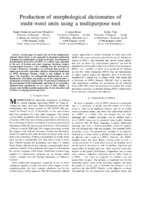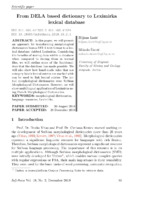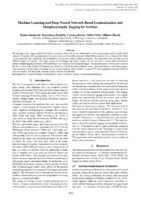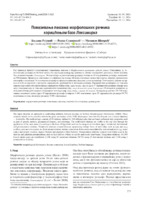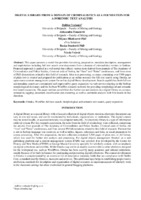Претрага
8 items
-
Using English Baits to Catch Serbian Multi-Word Terminology
In this paper we present the first results in bilingual terminology extraction. The hypothesis of our approach is that if for a source language domain terminology exists as well as a domain aligned corpus for a source and a target language, then it is possible to extract the terminology for a target language. Our approach relies on several resources and tools: aligned domain texts, domain terminology for a source language, a terminology extractor for a target language, and a ...aligned texts, word alignment, terminology extraction, electronic dictionaries, morphological inflectionCvetana Krstev, Branislava Šandrih, Ranka Stanković. "Using English Baits to Catch Serbian Multi-Word Terminology" in Proceedings of the 11th International Conference on Language Resources and Evaluation, LREC 2018, Miyazaki, Japan, May 7-12, 2018, European Language Resources Association (ELRA) (2018) M33
-
Production of morphological dictionaries of multi-word units using a multipurpose tool
The development of a comprehensive morphological dictionary of multi-word units for Serbian is a very demanding task, due to the complexity of Serbian morphology. Manual production of such a dictionary proved to be extremely time-consuming. In this paper we present a procedure that automatically produces dictionary lemmas for a given list of multi-word units. To accomplish this task the procedure relies on data in e-dictionaries of Serbian simple words, which are already well developed. We also offer an evaluation ...electronic dictionary, Serbian, morphology, inflection, multi-word units, noun phrases, query expansionRanka Stanković, Ivan Obradović, Cvetana Krstev, Duško Vitas. "Production of morphological dictionaries of multi-word units using a multipurpose tool" in Proceedings of the Computational Linguistics-Applications Conference, October 2011, Jachranka, Poland, Jachranka, Poland : PTI - Polish Information Processing Society (2011) M33
-
Combining Heterogeneous Lexical Resources
Cvetana Krstev, Duško Vitas, Ranka Stanković, Ivan Obradović, Gordana Pavlović-Lažetić. "Combining Heterogeneous Lexical Resources" in Proceedings of the Fourth Interantional Conference on Language Resources and Evaluation, Lisabon, Portugal , May 2004, vol. 4, ELRA - European Language Resources Association (2004) М33
-
Knowledge and Rule-Based Diacritic Restoration in Serbian
In this paper we present a procedure for the restoration of diacritics in Serbian texts written using the degraded Latin alphabet. The procedure relies on the comprehensive lexical resources for Serbian: the morphological electronic dictionaries, the Corpus of Contemporary Serbian and local grammars. Dictionaries are used to identify possible candidates for the restoration, while the dataobtainedfromSrpKorandlocalgrammarsassistsinmakingadecisionbetween several candidates in cases of ambiguity. The evaluation results reveal that,dependingonthetext,accuracyrangesfrom95.03%to99.36%,whilethe precision (average 98.93%) is always higher than the recall (average 94.94%).Cvetana Krstev, Ranka Stanković, Duško Vitas. "Knowledge and Rule-Based Diacritic Restoration in Serbian" in Proceedings of the Third International Conference Computational Linguistics in Bulgaria (CLIB 2018), May 27-29, 2018, Sofia, Bulgaria, Sofia : The Institute for Bulgarian Language Prof. Lyubomir Andreychin, Bulgarian Academy of Sciences (2018): 41-51 M33
-
From DELA Based Dictionary to Leximirka Lexical Database
Biljana Lazić, Mihailo Škorić (2020)In this paper, we will present an approach in transforming Serbian language Morphological dictionaries from a DELA text format to a lexical database dubbed Leximirka. Considering the benefits of storing data within a database when compared to storing them in textual documents, we will outline some of the functionality that the database has made possible. We will also show how hand-made rules that use category labels lexical entries are marked with can be used to link lexical entries. ...Biljana Lazić, Mihailo Škorić. "From DELA Based Dictionary to Leximirka Lexical Database" in Infotheca, Faculty of Philology, University of Belgrade (2020). https://doi.org/10.18485/infotheca.2019.19.2.4 М53
-
Machine Learning and Deep Neural Network-Based Lemmatization and Morphosyntactic Tagging for Serbian
The training of new tagger models for Serbian is primarily motivated by the enhancement of the existing tagset with the grammatical category of a gender. The harmonization of resources that were manually annotated within different projects over a long period of time was an important task, enabled by the development of tools that support partial automation. The supporting tools take into account different taggers and tagsets. This paper focuses on TreeTagger and spaCy taggers, and the annotation schema alignment ...Ranka Stanković, Branislava Šandrih, Cvetana Krstev, Miloš Utvić, Mihailo Škorić. "Machine Learning and Deep Neural Network-Based Lemmatization and Morphosyntactic Tagging for Serbian" in Proceedings of the 12th Language Resources and Evaluation Conference, May Year: 2020, Marseille, France, European Language Resources Association (2020) М33
-
Повезивање лексема морфолошких речника коришћењем базе Лексимирка
Рад приказује приступ успостављању повезивања лексема у Морфолошким речницима српског језика. Повезивање, тј. успостављање релација не би било могуће без претходне конверзије речника из облика текстуалних датотека у облик лексичке базе података назване Лексимирка. Методологија за успостављање релација почива на 69 појединачних релација заснованих на 388 правила. Правила за повезивање се дефинишу на основу обележја лексичких записа (врсте речи, маркера, граматичких категорија и подниски). Успостављене релације су крајњем кориснику видљиве путем апликације Лексимирка у форми хипервеза и могу се ...Биљана Рујевић, Ранка Станковић, Михаило Шкорић. "Повезивање лексема морфолошких речника коришћењем базе Лексимирка" in Модерни речници у функцији просечнога корисника: стари проблеми, савремени правци и нови изазови, Лексикографски сусрети, Београд, 27-29. мај 2024. , Београд : Филолошки факултет (2024). https://doi.org/10.18485/lexicog_meet.2024.1.ch23 М33
-
Digital Library From A Domain Of Criminalistics As A Foundation For A Forensic Text Analysis
U ovom radu predstavljen je model koji omogućava prikupljanje, pripremu, opis metapodataka, upravljanje i eksploataciju, uključujući pretragu punog teksta dokumenata iz domena kriminalistike napisanih na srpskom jeziku. Predloženi pristup primenjuje se na veb portalu koji sakuplja različite tekstove nastale iz časopisa Akademije za kriminalistiku i policijske studije, Krivičnog zakona Srbije, konferencija „Tara“ i „Reiss“, kao i iz nekih doktorskih disertacija vezanih za ovu oblast istraživanje. Nakon obrade teksta, korpus koji sadrži preko 5500 stranica običnog teksta, kreiran je i ...Dalibor Vorkapić, Aleksandra Tomašević, Miljana Mladenović, Ranka Stanković, Nikola Vulović. "Digital Library From A Domain Of Criminalistics As A Foundation For A Forensic Text Analysis" in International Scientific Conference “Archibald Reiss Days” Thematic Conference Proceedings Of International Significance, Belgrade, 7-9 November 2017, Academy Of Criminalistic And Police Studies Belgrade (2017) М33

